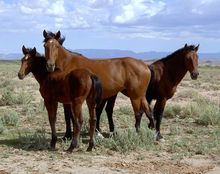A vehicle-horse accident on Highway 395 Alternate near Reno, Nevad, on Friday, November 20, 2015, has prompted wild horse organizations to call upon the Nevada Department of Transportation to immediately install cattle guards, fencing and take other public safety measures to prevent Virginia Range horses from accessing highways and other high-speed roadways where the horses are known to travel. The accident is in an area where Virginia Range horses are known to travel.

Free roaming mustangs endangered near highways
Three horses have been hit and killed on Old 395 south of Reno, Nevada, this past week, and horse advocates call for fences and cattle guards to keep the horses off highways.
Three horses have been hit and killed on Old 395 south of Reno this past week. The accidents have prompted Nevada's dpartments of agriculture and safety to warn drivers to be on the lookout, especially during the holiday travel season.
The first of those accidents happened near the intersection of Rawhide and Old 395 around 6:30PM November 17, 2015. One horse was killed, but the driver was not hurt.
Then the morning of November 20, a the driver of a Ford F-150 hit two horses around 6AM on 395 A and Pagni Drive. The driver had minor injures. Both horses died.
"They can be on a roadway pretty much 365 days a year, and this isn't necessarily a spike," explains Nevada Department of Agriculture's Flint Wright. Horses are more likely to stand in the roadway than to dart out, but you won't get much time to react. That's why you have to be actively watching for them, especially where the roads bend or after dark.
Weighing in at 500 to 1,500 pounds, a wild horse has enough mass to cause a fatality.
Local wild horse advocacy organizations and the American Wild Horse Preservation Campaign (AWHPC), which through its parent organization Return to Freedom (RTF) signed the precedent-setting Virginia Range Horse Management Cooperative Agreement with the Nevada Department of Agriculture (NDA), are urging NDOT to collaborate with NDA and wild horse advocacy organizations to address long-standing requests to improve safety on public roadways by taking preventative measures to keep horses off the high-speed roadways.
âNDOT had been requested to install a cattle guard in the same location where the accident occurred today. We have a number of requests before NDOT and are calling upon the agency to work collaboratively with NDA and the local community to implement specific actions that will improve safety on public roadways,â said Deniz Bolbol, AWHPC coordinator of the Cooperative Agreement program.
Earlier this year, AWHPC/RTF signed the Cooperative Agreement to humanely manage the Virginia Range horses. Local Nevada organizations working with AWHPC to implement the management program include Hidden Valley Wild Horse Protection Fund, Virginia Range Wildlife Protection Association, Wild Horse Preservation League, Virginia Range Sanctuary, and Wild Horse Connection.
The State has jurisdiction over the historic Virginia Range horses, which have roamed the northern Nevada mountain range for more than a century. Because they make their home on state, local and private land, instead of federal land, they are not protected under the federal Wild Free Roaming Horses and Burros Act, and are classified as âstray livestockâ by the state statute.
The American Wild Horse Preservation Campaign, founded in 2004 by Return to Freedom, is a coalition of more than 70 horse advocacy, public interest, and conservation organizations dedicated to preserving the American wild horse in viable, free-roaming herds for generations to come. Return to Freedom is dedicated to preserving the freedom, diversity and habitat of America's wild horses through sanctuary, education and conservation. RTF provides refuge to 400 wild horses at its California-based American Wild Horse Sanctuary.
